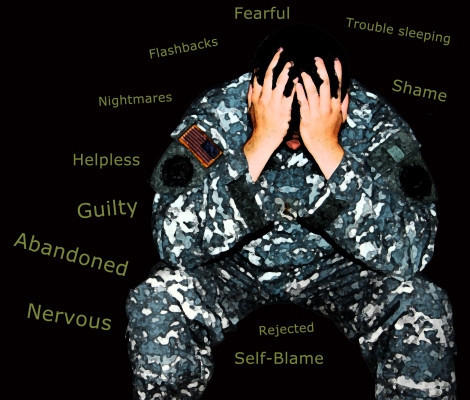After a traumatic experience, it’s normal to feel frightened, sad, anxious, and disconnected. But if the upset doesn’t fade and you feel stuck with a constant sense of danger and painful memories, you may be suffering from post-traumatic stress disorder (PTSD). It can seem like you’ll never get over what happened or feel normal again. But by seeking treatment, reaching out for support, and developing new coping skills, you can overcome PTSD and move on with your life.
Symptoms of PTSD
Post-Traumatic Stress Disorder (PTSD)
-
What is post-traumatic stress disorder (PTSD)?

Post-traumatic stress disorder (PTSD) can develop following a traumatic event that threatens your safety or makes you feel helpless.
Most people associate PTSD with battle-scarred soldiers—and military combat is the most common cause in men—but any overwhelming life experience can trigger PTSD, especially if the event feels unpredictable and uncontrollable.
Post-traumatic stress disorder (PTSD) can affect those who personally experience the catastrophe, those who witness it, and those who pick up the pieces afterwards, including emergency workers and law enforcement officers. It can even occur in the friends or family members of those who went through the actual trauma.
PTSD develops differently from person to person. While the symptoms of PTSD most commonly develop in the hours or days following the traumatic event, it can sometimes take weeks, months, or even years before they appear.
-
Signs and symptoms of post-traumatic stress disorder (PTSD)

The symptoms of post-traumatic stress disorder (PTSD) can arise suddenly, gradually, or come and go over time. Sometimes symptoms appear seemingly out of the blue. At other times, they are triggered by something that reminds you of the original traumatic event, such as a noise, an image, certain words, or a smell.
While everyone experiences PTSD differently, are some common types of symptoms:- Re-experiencing the traumatic event
- Avoiding reminders of the trauma
- Increased anxiety and Emotional Numbness
- Insomnia
- Suicidal Thoughts
- Addictions
- Depression
Leave a reply
Your email address will not be published. Fields marked * are mandatory.

Comments
No Comments